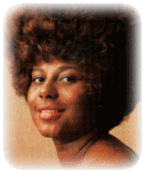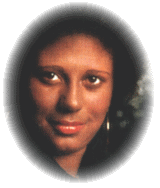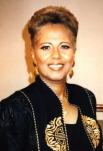|
|||||||||
If you have come
to this page through a frame, |
|||||||||
| Home | Discography | Interview |
Barbara Mason, one of the few ladies of Soul who not only sang but wrote a great portion of her material, began to "mess" with her grandmother's piano at a the tender age of twelve. While still in school, Barbara formed several groups, comprised of both male and female members. Barbara, the lead singer, would come up with the songs, accompany on the piano and naturally win many of the local talent shows, which were held at a playground near her house every summer. Her next door neighbor was Bill Oxydene of the Larks, a vocal group from Philly and it was another member of that constellation, Weldon Arthur McDougal III, who offered Barbara to perform during odd spots and intervals on the Larks' shows in various nightclubs around the Philadelphia area. McDougal also introduced Barbara to Jimmy Bishop, one of the the most popular DJ's in Philadelphia at the time. Bishop was suitably impressed with Barbara's easily identifiable, innocent-sounding voice and self-penned material and after aiding in the financing of her debut single "Trouble Child" on the local Crusader label, Bishop signed her to his Arctic Records. In 1964, at the age of seventeen, Barbara cut her first hit single "Girls Have Feelings Too" which went to #31 on the U.S. charts early the following year. But it would be with her second Arctic single that Barbara made the record she'll always be remembered for. Issued in August 1965, her self-penned "Yes, I'm Ready", which today is considered a Philly-Soul classic, indeed one of the first Philly-Soul records ever, blasted off to #2 on the R&B charts and #5 Pop. Interesting to note is that a nineteen year old Kenny Gamble sang backgrounds and several musicians who later would become Philly Icons, such as Bobby Eli, Earl Young, Roland Chambers and Jack Faith, played on the song. Guitarist Norman Harris, one of Barbara's closest friends, who would play on and arrange many of her 70's albums, toured with Barbara as her music director in the 60's, but was not allowed into the studio on most Arctic sessions because he could only play by ear, not read charts. Barbara's next release "Sad, Sad Girl" shot to #12 R&B and by 1968, after two more hits with "I Need Love" and "Oh, How It Hurts", Jimmy Bishop (who by now was the sole person handling her career) decided that she had outgrown the little Arctic label and signed her with National General in 1970. That company's main claim to fame was movie soundtracks and Barbara, who later would contribute to such classical blaxploitation flicks as "Gordon's War" and "Sheba Baby" did her first soundtrack while on National entitled "The Last Cowboy". After another album "If You Knew Him Like I Do" and a medium-sized hit with the B.J. Thomas cover "Raindrops Keep Falling On My Head", National General went out of business and Barbara was transferred to Buddah which had carried National General's products. Her first 45 on Buddah, "The Pow Pow Song", didn't do much, but the second, "Bed And Board", which showed a more mature side of Barbara, was a sign of the great things to come. It reached #24 R&B in 1972. After her third Buddah single, the sweet "Man and Woman" failed to gain any interest, Neil Bogart, the CEO of Buddah, who later would found Casablanca Records (home to Parliament, Kiss, Donna Summer and many others), arranged for Barbara to travel to Chicago and work with Curtis Mayfield. Curtis produced two songs on Barbara's Buddah album debut; "You Can Be With The One You Don't Love" (which Barbara penned) and the title track "Give Me Your Love", a song which Curtis had written and performed in the movie "Superfly". The single reached #9 on the R&B charts in late 1972. The "Give Me Your Love" LP was cleverly promoted. The late Neil Bogart, who rightfully has been described as a marketing genius, placed a huge billboard of Barbara on Sunset Boulevard in Los Angeles, wearing nothing but a man's shirt. The photo was also included on the sleeve of the LP and inside was a large poster. "It was incredible", Barbara laughed when I interviewed her earlier this year. "People would literally take the picture out and look upside down to see if I was naked underneath that shirt! I did have something underneath, but you just couldn't see it." The love theme continued on Barbara's sophomore set "Lady Love" issued in 1973. After furnishing the ballad "Child Of Tomorrow" to the soundtrack of the blaxploitation movie "Gordon's War", Barbara turned her attention to different subject matters. 1974's "Transition", which included her observations on social and political matters, was a labor of love. But hearing Barbara sing thought-provoking message songs like "Trigger Happy People", "Sunday Saint (Weekday Sinner) and "World In Crisis" was not what her fans wanted and regrettably the album flopped. Nor "Half Sister, Half Brother" or any of the other singles released charted, but before 1974 ended, Barbara was back on top of the charts with" From His Woman To You", her answer to Stax-diva Shirley Brown's "Woman To Woman". Unlike the previous albums -which were mainly cut at the legendary Sigma Sound Studios in Philadelphia- the splendid "Love's The Thing" was recorded in Detroit and featured the production skills of Don Davis who had worked with a virtual who's who in R&B, among those Johnnie Taylor and The Dramatics. "Love's The Thing", an essential Barbara Mason album, yielded yet another Top 10 hit "Shackin' Up" in 1975. That same year, Barbara sang on two, highly funky songs on the now hard-to-find soundtrack to "Sheba Baby". Her last recording on Buddah was a single with fellow-Philly vocal group The Futures. "Make It Last" was backed with "We Got Each Other" and was a medium sized double-sided hit in 1975.
She then turned to her old friend Curtis Mayfield, whom she had toured with in the sixties. Curtis was more than happy to add Barbara to his stable of Curtom artists and another Philly stalwart, Bunny Sigler, was hired to produce Barbara's Curtom debut. But as Barbara explained "..We just couldn't seem to click on the production. Bunny did the best he could but he really didn't know my style and Curtis left everything up to Bunny Sigler". The LP of duets with Sigler "Locked In This Position" came out on 1977. It was surprisingly weak, lacked any real sense of direction and didn't include a single Barbara Mason composition. Both the forgettable title track (which was issued on a 7" and 12") and the LP sunk without a trace. The subsequent year, 1978, Barbara signed with Prelude Records and released the "I Am Your Woman, She Is Your Wife" set, which both fans and critics responded much more favorably to. Produced by her "discoverer" Weldon McDougal, the title track, a continuation on the "adultery thread" initiated by Shirley Brown's "Woman To Woman", went to #14 R&B on the U.S. Billboard chart. But this was to be a short-termed relationship. After a conflict over publishing, Barbara left Prelude, only to find that Disco ruled the airwaves and she didn't fit in. That a certain someone had been spreading sinister rumors about her being a drug and alcohol addict and extremely difficult to work with, certainly didn't help when it came to finding a new recording home. Refusing to jump on the "Disco bandwagon", as Barbara called it, she faced severe financial problems and had to turn to Norman "The Harris Machine" Harris (of M.F.S.B. and B-H-Y fame) for help. Thanks to Norman Harris, music publicist Jack "The Rapper" Gibson (who wrote about Barbara's situation) and Harry Wayne Casey (a.k.a. K.C. from the Sunshine Band) there was a happy ending. K.C., together with songstress Teri DeSario, covered "Yes, I'm Ready" in 1979 and it was a massive hit, reaching #2 on the Billboard Pop chart and selling Gold, i.e. over a million copies.
Barbara left the
entertainment industry in the early eighties and instead chose to concentrate on forming
and developing her publishing company, Marc James Music, named after her son. But in 1992,
Barbara was invited to perform at the famous Greek Theatre in Los Angeles and has since
then been regularly returning to the venues on the American west coast. She seems to take
it in stride, but to the distress of her fans, Barbara, like so many of the "old
school" R&B singers is presently without a recording contract. She would of
course like one, she says, but not at any cost. "Yes, I am looking for a record deal.
If someone would love to record me, I'm probably in better voice than I've ever been. I'm
in better form. I'm ready to do it. But no matter what I'll always sing. I never wanna
stop singing. That's what I always dreamed of doing and it came true." |
|||||||||
|Home | Discography | Interview | |
|||||||||
|
|||||||||
© Maria Granditsky
May 1998. |
|||||||||
Home - Artists - What's New - Links - FAQ - Theme - About Me |

 Singer/songwriter Barbara "Lady Love" Mason,
one of the true pioneers of Philly-Soul, was born in Philadelphia, Pennsylvania in 1947.
Although she, like so many other young girls, had dreams of a becoming a star, she never
thought it would happen to her. But it did. She was still a minor when she had her first
hit record "Yes, I'm Ready" in 1965. Seven years later, she would be one of the
most celebrated Soul singers, only to disappear almost completely from the public eye in
the early eighties. This is a very compressed version of Barbara's story. To learn more
about her, read the five-part interview.
Singer/songwriter Barbara "Lady Love" Mason,
one of the true pioneers of Philly-Soul, was born in Philadelphia, Pennsylvania in 1947.
Although she, like so many other young girls, had dreams of a becoming a star, she never
thought it would happen to her. But it did. She was still a minor when she had her first
hit record "Yes, I'm Ready" in 1965. Seven years later, she would be one of the
most celebrated Soul singers, only to disappear almost completely from the public eye in
the early eighties. This is a very compressed version of Barbara's story. To learn more
about her, read the five-part interview. After Neil Bogart had departed from Buddah to form Casablanca,
Jimmy Bishop -Barbara's manager and main producer with whom she also had personal
relationship and a son- left Buddah to work for Kenny Gamble and Leon Huff's Philadelphia
International Records. Barbara, who noted a change in how the Buddah ship was run
post-Neil Bogart, followed suit after having experienced a poorly promoted -but otherwise
pleasant- tour with The Futures. But both on a personal and professional level, her
relationship with Jimmy Bishop was falling apart. "When someone has control over not
only your career, but your personal life, it's like they control your whole life..",
Barbara said. "They push all the buttons for you, they say yes and they say no. And
when things don't go right on one end, it affects the other end. So, the personal end was
affecting my career and we weren't making much progress." Finally, Barbara broke away
from both Jimmy Bishop and PIR. "What I learned from that is that business and
pleasure does not mix well". Still, Barbara's not bitter. ".. I have no
animosity against anyone. I feel that everybody did what they thought was best for me.
Some things worked out, some things didn't.. "
After Neil Bogart had departed from Buddah to form Casablanca,
Jimmy Bishop -Barbara's manager and main producer with whom she also had personal
relationship and a son- left Buddah to work for Kenny Gamble and Leon Huff's Philadelphia
International Records. Barbara, who noted a change in how the Buddah ship was run
post-Neil Bogart, followed suit after having experienced a poorly promoted -but otherwise
pleasant- tour with The Futures. But both on a personal and professional level, her
relationship with Jimmy Bishop was falling apart. "When someone has control over not
only your career, but your personal life, it's like they control your whole life..",
Barbara said. "They push all the buttons for you, they say yes and they say no. And
when things don't go right on one end, it affects the other end. So, the personal end was
affecting my career and we weren't making much progress." Finally, Barbara broke away
from both Jimmy Bishop and PIR. "What I learned from that is that business and
pleasure does not mix well". Still, Barbara's not bitter. ".. I have no
animosity against anyone. I feel that everybody did what they thought was best for me.
Some things worked out, some things didn't.. " Because of Jack the Rapper's article, WMOT Records (We Men Of
Talent) showed interest and in 1980 Barbara signed with the Philly-based label and
released "A Piece of My Life", produced by Norman
"Butch" Ingram; the brain behind Philly Cream and a member of the Ingram family
(remembered in the U.K. for their club classics "Smoothin' Groovin'" and
"Mi Sabrina Tequana"). "She's Got The Papers (But I Got The Man)",
Barbara's response to Richard "Dimples" Field's "She's Got Papers On
Me" went to #29 R&B in August 1981. Butch Ingram and Barbara continued
collaborating after WMOT went out of business and in 1984, Barbara returned to the charts
with the techno-funky "Another Man", yet another song on the
love triangle topic, but with an intricate twist. The man which Barbara, the mistress, had
taken away from his wife was according to the spoken rap "not the man we thought at
all". In fact, he was gay! "It did absolutely marvelous overseas, but it did not
do too well here in the United States", Barbara said. "A lot of the radio
programmers and DJ's thought that the content of the record did not fit their
format." Overseas, it got a different reception. "It was such a huge hit in
Europe that I was supposed to go there and tour with Jeffrey Osborne but then something
happened with that deal. Something also happened with my deal with West End. In fact
I had to sue them because they would not pay me correctly. They made all the money from
"Another Man". The only money I made was from performing a little bit in clubs
around New York, but the real money that I should have gotten, the producer took it."
Because of Jack the Rapper's article, WMOT Records (We Men Of
Talent) showed interest and in 1980 Barbara signed with the Philly-based label and
released "A Piece of My Life", produced by Norman
"Butch" Ingram; the brain behind Philly Cream and a member of the Ingram family
(remembered in the U.K. for their club classics "Smoothin' Groovin'" and
"Mi Sabrina Tequana"). "She's Got The Papers (But I Got The Man)",
Barbara's response to Richard "Dimples" Field's "She's Got Papers On
Me" went to #29 R&B in August 1981. Butch Ingram and Barbara continued
collaborating after WMOT went out of business and in 1984, Barbara returned to the charts
with the techno-funky "Another Man", yet another song on the
love triangle topic, but with an intricate twist. The man which Barbara, the mistress, had
taken away from his wife was according to the spoken rap "not the man we thought at
all". In fact, he was gay! "It did absolutely marvelous overseas, but it did not
do too well here in the United States", Barbara said. "A lot of the radio
programmers and DJ's thought that the content of the record did not fit their
format." Overseas, it got a different reception. "It was such a huge hit in
Europe that I was supposed to go there and tour with Jeffrey Osborne but then something
happened with that deal. Something also happened with my deal with West End. In fact
I had to sue them because they would not pay me correctly. They made all the money from
"Another Man". The only money I made was from performing a little bit in clubs
around New York, but the real money that I should have gotten, the producer took it."